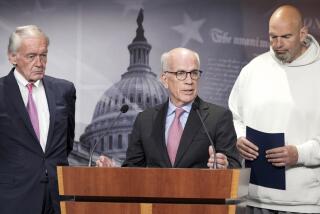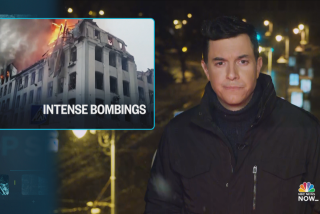Live, From Washington, It’s FedNet
- Share via
WASHINGTON — The Internet is rapidly becoming all things to all people: an information storehouse, a trade route between sellers and buyers, an inexpensive long-distance carrier and now a gazillion-channel broadcasting network.
Users and cruisers can tune in to radio stations throughout the world.
And now there’s FedNet. Though similar to the larger C-SPAN online service, FedNet hopes to offer live audio broadcasts of various congressional goings-on: floor debates, news conferences, committee hearings that are well-attended as well as those of little interest.
Launched Sept. 17, FedNet is the creation of Keith Carney, who runs the small for-profit company out of an Alexandria, Va., office complex. The service--which is free--is like an online radio, enabling users to listen to congressional hearings while doing other work on their computers.
*
Many, many, many services and Web pages are linked to government information, but, Carney said, “there are a significant number of events taking place on Capitol Hill that are not being covered by the established media. FedNet wants to bring issues to the American people that affect their lives but don’t always fit the interests of a national audience.”
For instance, Carney said, a hearing about a nuclear waste site on Yucca Mountain is not of interest to someone in Portland, Maine, but could be must-listening for someone in Nevada who lives near the site.
The rise of FedNet and C-SPAN online parallels the development of RealAudio software technology which does not store information in the computer, but allows sound to “stream” in like a radio signal.
By using RealAudio and other state-of-the-art technology, Carney said, FedNet is able to carry multiple hearings and floor debates. “The power of the medium makes it possible to produce multiple live events.”
“We originally designed this product for the media,” said Carney, “so that a reporter who is tracking Washington can get information right on his desktop.”
But Carney believes there’s a wider audience, anyone anywhere who has a computer with a sound card, access to the Internet and a 14.4 modem can sign on. FedNet provides a link to the RealAudio home page, where users can download the software necessary to receive sound for free. He hopes to make money by selling advertising to media online companies such as Congressional Quarterly and the Washington Post.
At the company’s kickoff news conference, Sen. Conrad Burns, R-Mont., a member of the Congressional Internet Caucus, said he was happy to have a hand in helping “connect people to their elected representatives in this new era of digital democracy.”
Armed Services disc jockey Adrian Cronauer, who emceed the news conference, argued that the audio version of proceedings would be superior to the Congressional Record. “Many times in legislative debate,” he said, “things are said with sarcasm or irony, which totally change the meaning as you read them on the written page. But now, through FedNet, people will have an opportunity to hear precisely the way it was said, as well as what was said.”
*
Eventually, of course, both FedNet and C-SPAN envision video feeds from Congress to computer users. But for now, the sounds of legislators must suffice.
Gary Ruskin, director of the Congressional Accountability Project, said, “Audio feeds from the House floor will be nice to have. I don’t think very many people will use it right now, but in the future it could be a good thing.
“We want Congress to be more open so citizens can hold their members accountable more easily,” he continued. “This is a step in the right direction. This is a good thing.”
But the system has glitches and is not expected to be at full throttle until February.
The software is still young and unpredictable. During one session last week, the voices of the Senate Appropriations and Special Aging committees’ combined meeting on medical research sounded a little gurgly and faded in and out on a Macintosh PowerPC.
It was sometimes impossible to identify who was speaking.
Another morning, all of the dates on the home page were incorrect. The calendar problem, Carney said, is temporary. The audio troubles, he said, were caused by the user’s computer.
“I’ve been told we’re doing very well,” Carney said. “I don’t know how many hits we’ve had.”
More to Read
Inside the business of entertainment
The Wide Shot brings you news, analysis and insights on everything from streaming wars to production — and what it all means for the future.
You may occasionally receive promotional content from the Los Angeles Times.








